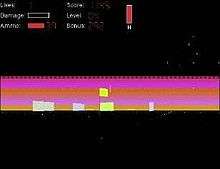Spectre (video game)
| Spectre | |
|---|---|
 Gameplay screenshot | |
| Developer(s) | Peninsula Gameworks |
| Publisher(s) | Velocity Development |
| Designer(s) | Sam Schillace, Steve Newman, Craig Fryar |
| Platform(s) | Macintosh; later versions also for Microsoft Windows, SNES, iPhone and iPad |
| Release |
1991 (Mac OS) 2010 (iOS) |
| Genre(s) |
Vehicular combat First-person shooter |
| Mode(s) |
Single player Multiplayer |
Spectre is a computer game for the Apple Macintosh, developed in 1990 by Peninsula Gameworks and published in 1991 by Velocity Development. It is a 3D tank battle reminiscent of the arcade game Battlezone. Later games in the series were released for the PC and SNES, with Spectre VR being named to a number of lists of best video games..
Gameplay
The goal of the game is to drive the tank around the playfield, collecting ten flags by driving over them, while avoiding obstacles (including rotating windmills) and the shots of computer-generated enemy tanks.
In single player mode, the player can choose four types of tanks, each one having different stats for shields, speed and ammo: Balance, Speedy, Strong and Custom. Each stage passed increases the game's difficulty (quantity and speed of enemy tanks). Furthermore, from level 6 appear orange cone-shaped tanks (which are faster and more resistant than normal enemy red tanks) and every 10 levels the shields of all enemy tanks are increased by 1. After level 9 is passed, the player can throw grenades, which cost 10 ammo and damage all enemy tanks in explosive range.
The game supported multiplayer operation over an AppleTalk network. Each player used a single Mac, and the other players were depicted as enemy tanks.
Sequels
A sequel, Spectre Supreme, was released in late 1993.
The original Spectre is often confused with the 1994 Spectre VR, an enhanced network-oriented version of the game. It and Spectre Supreme were also available for PC-compatible computers, but only Spectre was available for the SNES video game console.
The original Spectre was also released as Spectre Classic in the late 1990s.
On May 21, 2010, Brilliant Bytes Software released Spectre 3D (also known as Spectre: Cybertank Wars) for the Apple iPhone, iPod Touch, and iPad. This version includes levels from Spectre Classic and Spectre VR, four multiplayer games including Arena, Capture the Flag, Flag Rally and Base Raid, adds 3D visuals, and Bluetooth, Internet and WiFi multiplayer support for up to 16 players. Dedicated hosted servers are also available for online play.
Reception
Spectre was reviewed in 1992 in Dragon #184 by Hartley, Patricia, and Kirk Lesser in "The Role of Computers" column. The reviewers gave the game 5 out of 5 stars.[1] It was nominated for an award at the 1993 Game Developers Conference.[2]
Computer Gaming World in May 1994 stated that "Despite the ... pretensions of cyberspace spread throughout the documentation", Spectre VR "is distilled essence of video game ... The action is pure and uncluttered by anything like plot, depth or even realism". The reviewer approved of the new enemies and playfield features, but reported that the game "was released too soon" without IPX compatibility, level editor, and other features. He nonetheless concluded "I cannot help but be enamored of this game every time I play it. Spectre VR [is] an intelligent video game where you are free to act and react while the game twists and turns to keep you entertained".[3]
In 1996 Next Generation listed the Macintosh version of Spectre VR as the 44th best game of all time, citing the "minimalist, hi-res, flat-shaded polys", excellent control even with a keyboard, hundreds of one-player mode levels, and the "fast and furious multiplayer combat".[4]
References
- ↑ Lesser, Hartley; Lesser, Patricia & Lesser, Kirk (August 1992). "The Role of Computers". Dragon (184): 57–64.
- ↑ "The 7th International Computer Game Developers Conference". Computer Gaming World. July 1993. p. 34. Retrieved 12 July 2014.
- ↑ Cirulis, Martin E. (May 1994). "Shoot-out At The VR Corral". Computer Gaming World. pp. 28, 30.
- ↑ "Top 100 Games of All Time". Next Generation. No. 21. Imagine Media. September 1996. p. 55.
External links
- 1993 advertising text describing Spectre
- Review of Spectre VR
- Spectre at MobyGames
- Spectre for SNES at GameSpot
- iPhone and iPad versions since 2010 (latest version 1.3.0)